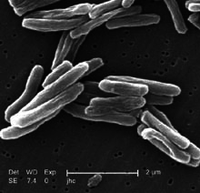Finished Project
This page refers to a project that is no longer active and so information here may be out of date or otherwise incorrect.
Tuberculosis in Portugal
Being the second deadliest infectious disease worldwide, Tuberculosis (TB) is a global public health concern. Portugal, a medium-low level endemic country, has one of the highest European Union Tuberculosis incidence rates. Although the incidence of Tubuerculosis in Portugal has shown a recent declining trend, the heterogeneity in both regional endemics and their evolution through time suggests that a deeper understanding of the spatiotemporal pattern of cases is needed. We are using information from the National Tuberculosis Surveillance System – General Directorate of Health - Ministry of Health (notified cases of PTB, annually), based on an agreement with the National School of Public Health, University Nova of Lisbon.
Our research in this area concentrates on two main objectives:
- Spatiotemporal modelling of success of treatment outcome, considering individual characteristics (socio-demographics, risk factors and associated pathologies) and ecological characteristics (environmental and contextual characteristics)
- Spatiotemporal survival analyses focussing on delay to diagnosis (time between symptoms and diagnosis), adjusting for individual characteristics (socio- demographics, risk factors and associated pathologies) and ecological characteristics (environmental and contextual characteristics)


